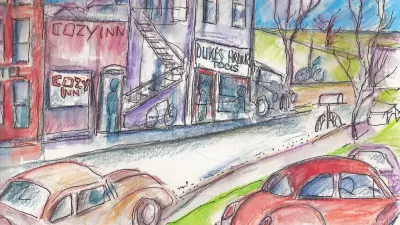Artists tend to flock to big cities where their art can be bought and appreciated, but economic hard times are sending artists fleeing towards cheaper rents on homes and studio space.
Michael Fallon writes that while artists are facing hard times in big art cities like New York and Los Angeles, other cities are rushing in to fill the void:
"Where can artists find arms welcoming enough to provide a chance to sustain their careers? Well, as it happens, perhaps sensing an opportunity in the leveled fields of the current economy several of America's bleakest, and most economically depressed, cities-Detroit, Baltimore, and Cleveland, among others-have begun making their case to become the next American artistic epicenter. All of these places have begun offering incentives like housing allowances (or otherwise cheap housing options), grants and other competitive awards, and other support to artists, even as they promise at least some of the cultural amenities-museums, arts events, and the like-that one can find in the Big Cities."
FULL STORY: A Diaspora of Artists

Maui's Vacation Rental Debate Turns Ugly
Verbal attacks, misinformation campaigns and fistfights plague a high-stakes debate to convert thousands of vacation rentals into long-term housing.

Planetizen Federal Action Tracker
A weekly monitor of how Trump’s orders and actions are impacting planners and planning in America.

In Urban Planning, AI Prompting Could be the New Design Thinking
Creativity has long been key to great urban design. What if we see AI as our new creative partner?

King County Supportive Housing Program Offers Hope for Unhoused Residents
The county is taking a ‘Housing First’ approach that prioritizes getting people into housing, then offering wraparound supportive services.

Researchers Use AI to Get Clearer Picture of US Housing
Analysts are using artificial intelligence to supercharge their research by allowing them to comb through data faster. Though these AI tools can be error prone, they save time and housing researchers are optimistic about the future.

Making Shared Micromobility More Inclusive
Cities and shared mobility system operators can do more to include people with disabilities in planning and operations, per a new report.
Urban Design for Planners 1: Software Tools
This six-course series explores essential urban design concepts using open source software and equips planners with the tools they need to participate fully in the urban design process.
Planning for Universal Design
Learn the tools for implementing Universal Design in planning regulations.
planning NEXT
Appalachian Highlands Housing Partners
Mpact (founded as Rail~Volution)
City of Camden Redevelopment Agency
City of Astoria
City of Portland
City of Laramie




























